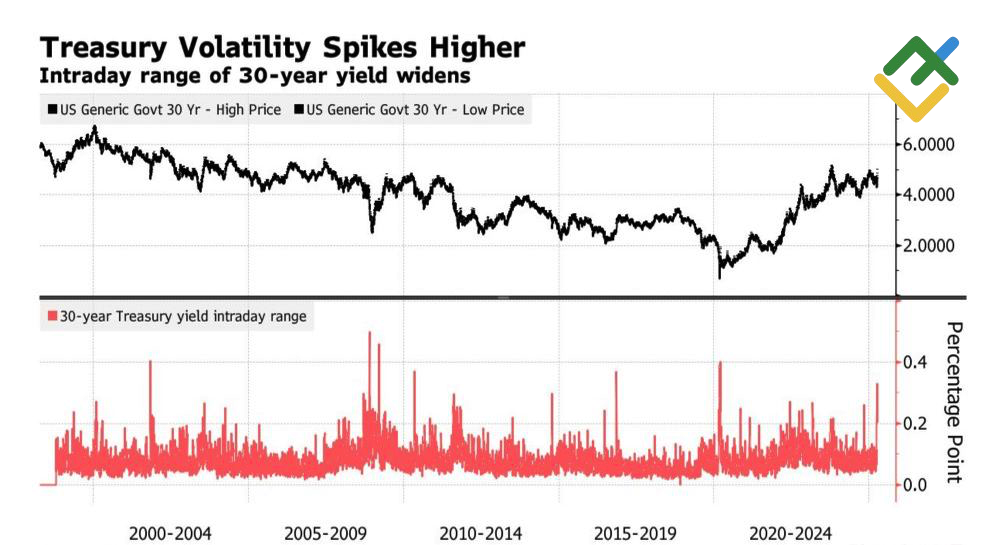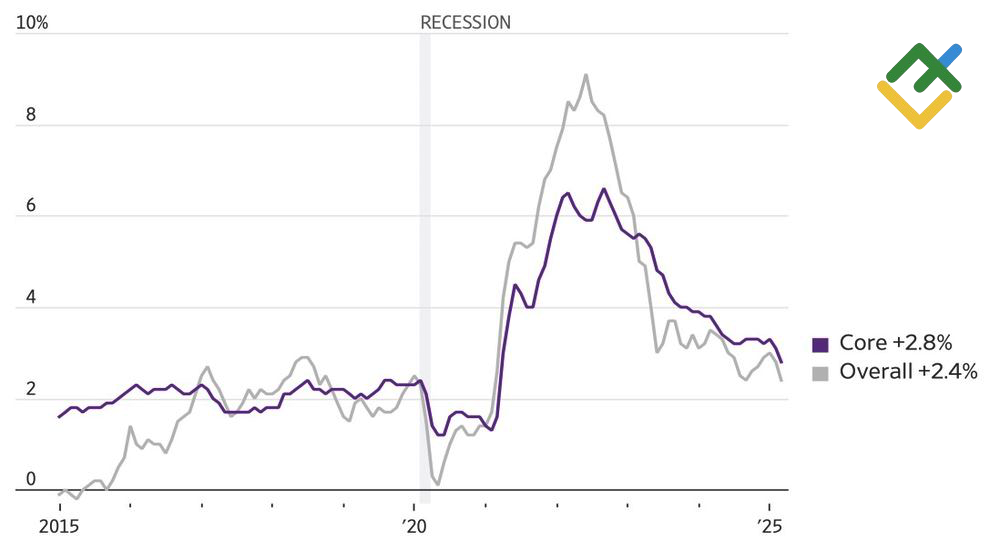
The global trade war has triggered a sweeping sell-off in US stocks and bonds, pointing to waning American exceptionalism. Capital spillover from North America to Europe is driving the EURUSD pair closer to 1.15. Let’s discuss this topic and make a trading plan.
The article covers the following subjects:
Major Takeaways
- New tariff threats have slammed the S&P 500 index.
- A rise in European stocks amid a drop in US stocks buoyed the euro.
- The Fed may aggressively cut rates and launch QE.
- Long trades can be opened as the EURUSD rally to 1.15 continues.
Weekly US Dollar Fundamental Forecast
The pause is only a postponement, but it does not signal the end of tariff chaos. Investors rapidly shifted away from the euphoria surrounding the White House’s declaration of a temporary halt to import duties. Their average fell slightly, from 27% to 24%, as the announcement of a 145% levy on China and Donald Trump’s threats toward Mexico instilled a sense of anxiety back into the markets. The S&P 500 index plummeted, which, when combined with the significant decrease in Treasury yields, led to a depreciation of the US dollar.
The USD index hit a six-month low, reflecting diminished confidence in US assets, recession fears, and expectations that the Fed would promptly intervene to support the economy through aggressive rate cuts and quantitative easing (QE).
Recently, the United States has experienced significant economic growth, advancements in artificial intelligence technology, and a notable rally in stock indices. This period has also fueled the discourse around American exceptionalism, a notion that has recently been called into question, potentially impacting the EURUSD outlook. The White House policies have made the US less predictable and more isolated. This shift has led to a perception among non-residents that the US is a less secure investment destination.
US Treasury Bond Yields
Source: Bloomberg.
The loss of American exceptionalism was evident in the decline of the S&P 500 until April. However, as the middle of the spring approached, the US bond market witnessed capital flight. US Treasuries, which rallied during the global economic crisis of 2008 and the downgrade of the US credit rating in 2011, are now trading as a risky rather than safe asset. Their yields are rising sharply due to fears that China and Japan may start to dispose of the US securities.
This could prompt the Fed to intervene through measures such as quantitative easing (QE) and rate cuts to stabilize the situation. The recent month-over-month decline in the Consumer Price Index (CPI) for the first time since May 2020 allows the US regulator to resume its monetary expansion cycle. On a year-over-year basis, CPI increased by 2.4%, while core inflation reached 2.8%, marking the lowest rate observed in the past four years.
US Inflation Change
Source: Wall Street Journal.
In times of such economic turmoil, safe-haven currencies such as the yen, the franc, and the euro do their best. The EURUSD uptrend commenced under Friedrich Merz and Germany’s fiscal stimulus and has persisted due to capital flight from North America to Europe. The EuroStoxx 600 rally, followed by the S&P 500 drop, allowed the single currency to soar toward the resistance level of 1.105 and rally towards the previously set target of 1.15.
Weekly EURUSD Trading Plan
Long positions on the EURUSD pair opened at 1.09 proved to be a sound strategy. The quotes failed to rebound from 1.105, so the most effective move was to open more long positions at that level. The recent pullback in the euro, coinciding with the decline in European stock indices at the end of the week, presents a valuable opportunity to build up long positions.
This forecast is based on the analysis of fundamental factors, including official statements from financial institutions and regulators, various geopolitical and economic developments, and statistical data. Historical market data are also considered.
Price chart of EURUSD in real time mode
The content of this article reflects the author’s opinion and does not necessarily reflect the official position of LiteFinance broker. The material published on this page is provided for informational purposes only and should not be considered as the provision of investment advice for the purposes of Directive 2014/65/EU.
According to copyright law, this article is considered intellectual property, which includes a prohibition on copying and distributing it without consent.
{{value}} ( {{count}} {{title}} )
This post is originally published on LITEFINANCE.





